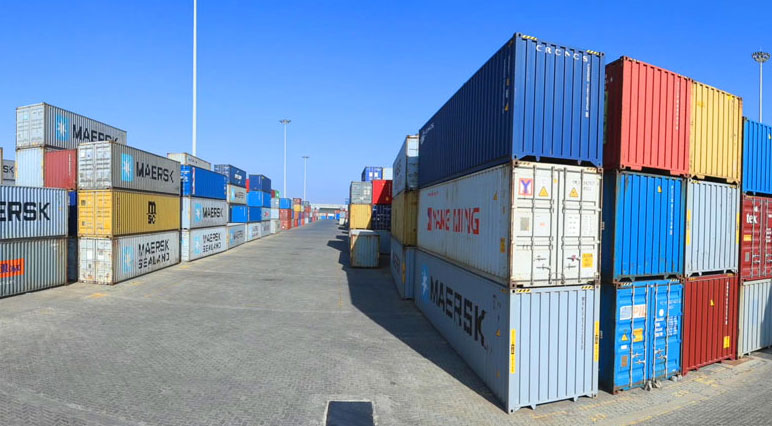
In the mild weather, late afternoon last week, a young college student in his 20s was on his third-day visit to the Addis Abeba Airport Customs Office. Dawit Berhane waited for more than an hour outside while his sister searched for her baggage in the warehouse. The consecutive days of taking too much time without progress have left him puzzled and exhausted.
"This is too much," he said before hopping onto the next public transport that flew past, opting to return home without his sister.
A tin roof protects an eclectic crowd huddled around the Customs Airport Cargo Branch Office gates. The long tedious security protocol only allows one person to enter while exhausted faces are waiting for people toiling to complete their clearance of goods in the giant compound.
Upon entrance into the 'judgment hall', a loosely hanging curtain protects the officer and client from the prying eyes in the hall. Timid clients were scattered along the auditorium, waiting for their number to be called to the officer who decides their fate. The packages then get picked apart to classify the assortment of each item with a unique number and tag. The decision by the officer will lead the client to commence payment through Commercial Bank of Ethiopia branch offices before one can finally receive the goods from the warehouse. Few people emerge from the curtain with a smile. This seemingly simple procedure may get complicated by several setbacks, "system crash", difficulty locating the luggage from the giant warehouse, or disagreement with the officer.
Nathan Gebremichael recently flew in from Dubai, paying close to 11,000 Br for cargo shipment duties of 130Kg. After three years in the Middle East, he had hoped to shower his family with gifts for the holiday season.
He was surprised by the duty levied on his favourite possession, a base guitar he does not leave anywhere. He says he did not intend to sell any of the items he brought. However, the levied tariff did not frustrate him as much as the time wasted to clear out.
The Ethiopian Customs Commission enforced the bill ordained by the Ministry of Finance four months ago, claiming to address the booming contraband under the guise of personal use items. A Federal Ethics & Anti-Corruption Commission report revealed that a third of the duty-free privileges and tax exemptions were exposed to abuse last year, listing 16 personal use items at stated quantities, such as 200 cigarettes, two litres of alcohol, a single wheelchair, laptop and watch among others. Returnees that wish to bring an additional item are obliged to pay taxes.
The Tax Policy Director at the Ministry of Finance, Mulay Woldu, believes the implementation has disincentivised contraband. According to Mulay, the directive followed a series of complaints from importers who claimed it was unjust to levy tariffs on them while allowing passengers to bring various goods in bulk under the pretext of personal use. He reasoned that it was unreasonable for importers with business licenses.
The arbitrary seeming nature of duties placed on customers has tried passengers.
In her late 20s, Kidist Sahle is one of the frequent customers at the Addis Abeba Airport Customs Office. She regularly goes to Dubai and brings a variety of items on her way back. Although the new procedure aimed to disincentivise contraband, the inconsistency led her to believe it was not implemented as planned. She recalls an incident where she paid tax for ring lights that she had brought into the country without payment a week prior.
"It is always a gamble on the mood of the officers. They tax you one week and leave you the next," she told Fortune.
Rosa, another regular at the customs branch office, runs a hair salon around the Gergi area and sells makeup tools and leggings on the side. She was emotional about being obliged to pay taxes despite ordering six packs of makeup brushes from Dubai. The officer unpacked the six boxes that revealed 36 pieces inside, leaving her with the unprecedented payment. The infuriated 23-year-old believes that the items should have been counted as a set and that the officer should have given her a pass. She claims that the orders were for a gift this time following the holiday season.
"It is my right," said Rosa.
According to her, a week of back and forth in demand for retraction of the decision has left her fatigued without a proper address as the officer that confiscated the items was absent at the workplace. She found herself going back to sign off the papers on the third day.
"It feels like the rules are just made up," she told Fortune.
Bedru Hassen has been running a customs clearing agency for nearly 15 years, with prior employment for a decade at the Customs Commission. He is ecstatic that his business has improved following the directive, as most people go through clearing agents to avoid the hustle. The middle-aged Bedru attributes the frustrations to being unfamiliar with the law. He is puzzled to witness the frustration with customers as most of the operation manuals and directives are available online for free.
According to him, the customs officers look at several factors besides the number of items, such as travel history, when inspecting cargo.
A month after the implementation, the number of packages handled by the cargo Customs Commission had declined from 3657 to 2452 bundles. While passengers are hustling through the process, licensed businesses that could not compete with untaxed goods in the market seemed to sigh a breath of relief.
"The traders from Dubai had killed our business," said Semir Kedir.
He has a dress shop around the Merkato area and gets the fabric from wholesalers while contracting tailors to create sow according to his designs. Semir occasionally imports a fabric and says the customs process does not frustrate him as he knows the tariffs. He welcomes the implementation and would even support further restrictions on the "freelancers".
The Addis Abeba Airport Customs Office has collected above five billion Birr in the last five months of the fiscal year.
Mekdim Girma, vice director of customs operations, has seen a one-third decline in cargo operations under the guise of personal use. He recalls cases where passengers have transitioned into cargo mechanisms.
"We encourage legal businesses," he told Fortune.
PUBLISHED ON
Jan 07,2023 [ VOL
23 , NO
1184]

Fortune News | Jun 12,2021

Commentaries | Apr 13, 2025

Fortune News | Jul 21,2024

Fortune News | Apr 06,2019

Commentaries | May 10,2025

Dec 22 , 2024 . By TIZITA SHEWAFERAW
Charged with transforming colossal state-owned enterprises into modern and competitiv...

Aug 18 , 2024 . By AKSAH ITALO
Although predictable Yonas Zerihun's job in the ride-hailing service is not immune to...

Jul 28 , 2024 . By TIZITA SHEWAFERAW
Unhabitual, perhaps too many, Samuel Gebreyohannes, 38, used to occasionally enjoy a couple of beers at breakfast. However, he recently swit...

Jul 13 , 2024 . By AKSAH ITALO
Investors who rely on tractors, trucks, and field vehicles for commuting, transporting commodities, and f...

Jun 28 , 2025
Meseret Damtie, the assertive auditor general, has never been shy about naming names...

Jun 21 , 2025
A well-worn adage says, “Budget is not destiny, but it is direction.” Examining t...

Jun 14 , 2025
Yet again, the Horn of Africa is bracing for trouble. A region already frayed by wars...

Jun 7 , 2025
Few promises shine brighter in Addis Abeba than the pledge of a roof for every family...